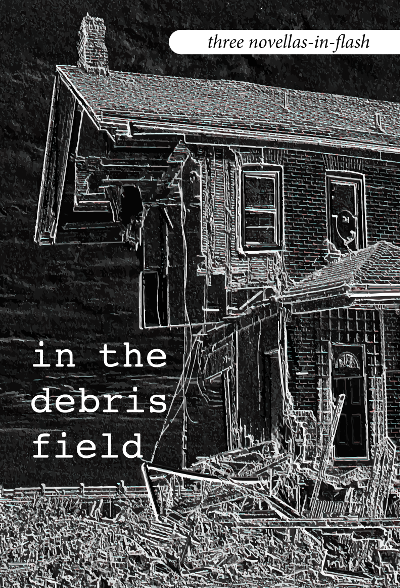
by AnnaLee Barclay
To a flash fiction newcomer, the task of writing such a short story may seem easy, as though length is an indicator of difficulty. In my experience, it is the opposite—having a small amount of space to tell a full story adds extra weight to every single word because there cannot be anything superfluous or unnecessary. Each detail must be working to tell the story as succinctly as possible, as well as move the plot forward. This is generally true of writing, though longer forms of narrative have a bit more wiggle room to pack a punch while the shorter forms barely have time to wind up a fist. The Bath Flash Fiction Award posed the challenge of writing flash pieces that together comprise a novella but could stand alone if read apart from one another. The three authors of this chapbook created remarkable works of fiction that carry heavy loads on the very short, but strong backs of flash writing. Taken together, this compilation invites the reader to share liminal spaces with grief-stricken and confused characters who are written with honesty and acute awareness of the human condition.
The winner of the award, Luke Whisnant, presents us with “In the Debris Field”, a fragmented look at a broken family as it is navigated by one of the three children, Dennis, who is almost exclusively referred to as “you” throughout the pieces. Utilizing second person as a consistent narrative can be hard to pull off because it risks alienating the reader if he or she does not identify with anything following the “you”. However, Whisnant’s distillation of emotions and memories into strong language and imagery draws the reader in immediately and arguably has an even stronger impact than had he written from a different point of view. The stories cover specific, disjointed memories, such as schoolchildren using various items to construct a witch to burn at the Halloween festival, a father and his two sons rummaging for loot in a debris field after a hurricane, and siblings discovering a haunted, gnarled tree root while wandering the woods. A father leaves a mother for a young woman. Later, the mother leaves for good, abandoning her children with the father and the new step-mother, who eventually leaves to go back to her first husband. A brother gets addicted to heroin and eventually dies of an overdose. A sister struggles with romantic relationships over and over. These small, quiet tragedies that mark everyday human life are navigated by Dennis, a sensitive boy whose nonlinear memories thread together seemingly random instances that come together as a whole portrait of the pains that quietly mark us throughout our lives, particularly adolescence.
The second story, “Latter Day Saints” by Jack Remiel Cottrell, jumps from saint-to-saint as a young man seems to be searching for something, anything he can learn from each one. It never becomes entirely clear what it is he’s after but through his interactions with the different saints, the reader comes to understand that he is grasping for answers to life’s questions through the various facets of the human experience. Even if you don’t know what each saint represents, Cottrell’s unique portrayal of each clearly conveys their various domains—but there is still a handy index at the end, which even works as its own powerful flash piece. We travel with the narrator from St. Oran, the (unofficial) patron saint of atheists, to St. Jude, not to be confused with Judas, with some others in between. We meet St. Francis, who lives alone in a cottage on a cliff above the ocean where people go to commit suicide, as he is the patron saint of solitary death. Cottrell pushes up against our celebrity obsession through St. Clare, the patron saint of television, who makes a striking statement: “No one on TV is a person.” Our narrator has a similar realization about these saints our society worships when he says to St. Oran, “No saint reminds me of myself. That’s what I like about them.” This highly unique novella asks us to dig into our own perceptions of the world and how it operates as we struggle with our own personal journeys.
Victoria Melekian closes the book with “A Slow Boat to Finland”, a grief-stricken novella about a mother, Kat, trying to navigate the horrendous sorrow that engulfs her after losing a toddler daughter, Molly. Melekian’s prose is strong and blunt, yet there is a dreamy lyricism to it that carries Kat through the sort of brain-fog that comes after trauma. We experience her unraveling as she develops a relationship with the young girl who received Molly’s heart in an organ transplant and the tension between the sacrifice and gift is palpable. Melekian takes advantage of the different pieces by introducing other perspectives, including Kat’s husband whose extremely human “mistake” is what led to Molly’s death, helps illuminate the insidious and subtle ways tragedy touches different people’s lives. Kat wonders, “How do you move on from a loved one you carry in the marrow of your bones?” The reader will be left wondering not so much how Kat will move on but how will she learn to carry her sorrow and live a full life again as a motherless child.
There is a constant sense of finding and then losing throughout these pieces, as though everyone is in a debris field of their own lives, searching for answers to unanswerable questions or people never to be seen again. The joy of reading flash fiction is being completely absorbed and emotionally impacted by a small window into characters’ lives. This chapbook is an incredible compilation of flash at its finest.
In the Debris Field (Bath Flash Fiction Award compilation)–by Luke Whisnant, Jack Remiel Cottrell, and Victoria Melekian–is available from Ad Hoc Fiction.
__________________________
 AnnaLee Barclay is a photographer and writer from Long Island. She was recently a member of The Lie Factory, a 12-week long fiction workshop taught by Lidia Yuknavitch and Chuck Palahniuk in Portland, OR. She is a reader for The Southampton Review and her work has appeared in Pretty Owl Poetry. You can find her on Instagram and Twitter @annaleebarclay.
AnnaLee Barclay is a photographer and writer from Long Island. She was recently a member of The Lie Factory, a 12-week long fiction workshop taught by Lidia Yuknavitch and Chuck Palahniuk in Portland, OR. She is a reader for The Southampton Review and her work has appeared in Pretty Owl Poetry. You can find her on Instagram and Twitter @annaleebarclay.

 The core workshop of SmokeLong Fitness is all in writing, so you can take part from anywhere at anytime. We are excited about creating a supportive, consistent and structured environment for flash writers to work on their craft in a community. We are thrilled and proud to say that our workshop participants have won, placed, or been listed in every major flash competition. Community works.
The core workshop of SmokeLong Fitness is all in writing, so you can take part from anywhere at anytime. We are excited about creating a supportive, consistent and structured environment for flash writers to work on their craft in a community. We are thrilled and proud to say that our workshop participants have won, placed, or been listed in every major flash competition. Community works.